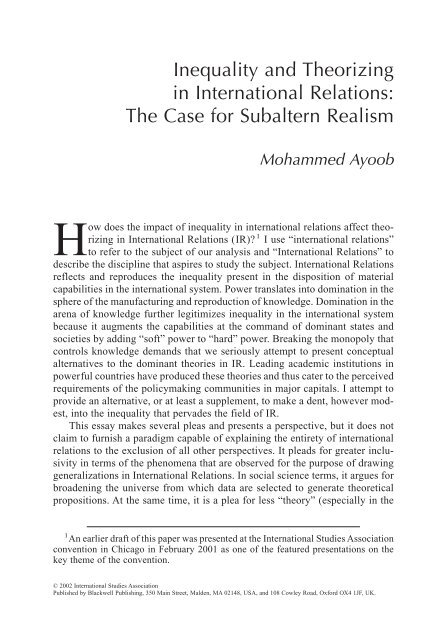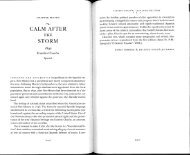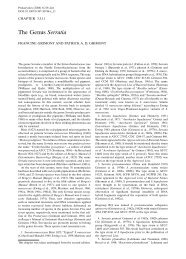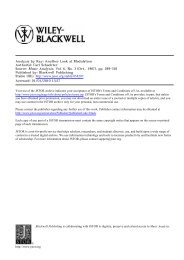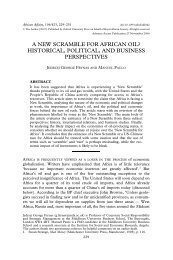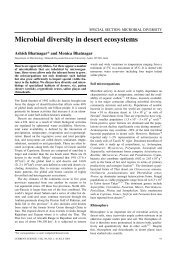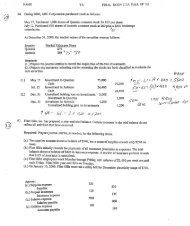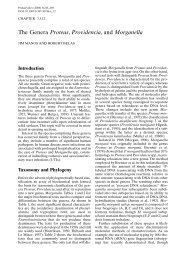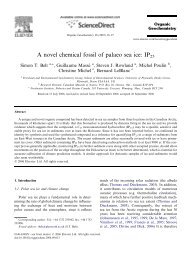Inequality and Theorizing in International Relations: The Case for ...
Inequality and Theorizing in International Relations: The Case for ...
Inequality and Theorizing in International Relations: The Case for ...
You also want an ePaper? Increase the reach of your titles
YUMPU automatically turns print PDFs into web optimized ePapers that Google loves.
<strong>Inequality</strong> <strong>and</strong> <strong><strong>The</strong>oriz<strong>in</strong>g</strong><br />
<strong>in</strong> <strong>International</strong> <strong>Relations</strong>:<br />
<strong>The</strong> <strong>Case</strong> <strong>for</strong> Subaltern Realism<br />
Mohammed Ayoob<br />
How does the impact of <strong>in</strong>equality <strong>in</strong> <strong>in</strong>ternational relations affect theoriz<strong>in</strong>g<br />
<strong>in</strong> <strong>International</strong> <strong>Relations</strong> (IR)? 1 I use “<strong>in</strong>ternational relations”<br />
to refer to the subject of our analysis <strong>and</strong> “<strong>International</strong> <strong>Relations</strong>” to<br />
describe the discipl<strong>in</strong>e that aspires to study the subject. <strong>International</strong> <strong>Relations</strong><br />
reflects <strong>and</strong> reproduces the <strong>in</strong>equality present <strong>in</strong> the disposition of material<br />
capabilities <strong>in</strong> the <strong>in</strong>ternational system. Power translates <strong>in</strong>to dom<strong>in</strong>ation <strong>in</strong> the<br />
sphere of the manufactur<strong>in</strong>g <strong>and</strong> reproduction of knowledge. Dom<strong>in</strong>ation <strong>in</strong> the<br />
arena of knowledge further legitimizes <strong>in</strong>equality <strong>in</strong> the <strong>in</strong>ternational system<br />
because it augments the capabilities at the comm<strong>and</strong> of dom<strong>in</strong>ant states <strong>and</strong><br />
societies by add<strong>in</strong>g “soft” power to “hard” power. Break<strong>in</strong>g the monopoly that<br />
controls knowledge dem<strong>and</strong>s that we seriously attempt to present conceptual<br />
alternatives to the dom<strong>in</strong>ant theories <strong>in</strong> IR. Lead<strong>in</strong>g academic <strong>in</strong>stitutions <strong>in</strong><br />
powerful countries have produced these theories <strong>and</strong> thus cater to the perceived<br />
requirements of the policymak<strong>in</strong>g communities <strong>in</strong> major capitals. I attempt to<br />
provide an alternative, or at least a supplement, to make a dent, however modest,<br />
<strong>in</strong>to the <strong>in</strong>equality that pervades the field of IR.<br />
This essay makes several pleas <strong>and</strong> presents a perspective, but it does not<br />
claim to furnish a paradigm capable of expla<strong>in</strong><strong>in</strong>g the entirety of <strong>in</strong>ternational<br />
relations to the exclusion of all other perspectives. It pleads <strong>for</strong> greater <strong>in</strong>clusivity<br />
<strong>in</strong> terms of the phenomena that are observed <strong>for</strong> the purpose of draw<strong>in</strong>g<br />
generalizations <strong>in</strong> <strong>International</strong> <strong>Relations</strong>. In social science terms, it argues <strong>for</strong><br />
broaden<strong>in</strong>g the universe from which data are selected to generate theoretical<br />
propositions. At the same time, it is a plea <strong>for</strong> less “theory” (especially <strong>in</strong> the<br />
1 An earlier draft of this paper was presented at the <strong>International</strong> Studies Association<br />
convention <strong>in</strong> Chicago <strong>in</strong> February 2001 as one of the featured presentations on the<br />
key theme of the convention.<br />
© 2002 <strong>International</strong> Studies Association<br />
Published by Blackwell Publish<strong>in</strong>g, 350 Ma<strong>in</strong> Street, Malden, MA 02148, USA, <strong>and</strong> 108 Cowley Road, Ox<strong>for</strong>d OX4 1JF, UK.
28 Mohammed Ayoob<br />
s<strong>in</strong>gular) <strong>and</strong> more perspectives. It is, f<strong>in</strong>ally, a plea aga<strong>in</strong>st m<strong>in</strong>dless “scientism,”<br />
which attempts to f<strong>in</strong>d law-like generalizations on the model of the physical<br />
sciences, <strong>and</strong> <strong>for</strong> more explicit reliance on the exercise of judgment <strong>and</strong>,<br />
there<strong>for</strong>e, greater modesty <strong>in</strong> our claims <strong>for</strong> our favored perspective. This does<br />
not mean that scholars should eschew rigorous <strong>and</strong> careful test<strong>in</strong>g of alternative<br />
explanations. All it denotes is that we must desist from mak<strong>in</strong>g claims about<br />
f<strong>in</strong>d<strong>in</strong>g timeless universal laws divorced from historical context.<br />
Simultaneously, I attempt to put <strong>for</strong>ward a perspective that is <strong>in</strong>adequately<br />
emphasized <strong>and</strong> barely discussed <strong>in</strong> IR theoretical literature. As I shall expla<strong>in</strong><br />
below, such a perspective has enormous capacity to expla<strong>in</strong> two of the most<br />
important issues that any IR theory must satisfactorily expla<strong>in</strong> to be credible:<br />
(1) the orig<strong>in</strong>s of the majority of current conflicts <strong>in</strong> the <strong>in</strong>ternational system,<br />
<strong>and</strong> (2) the variables determ<strong>in</strong><strong>in</strong>g the domestic <strong>and</strong> external behavior of the<br />
majority of members of the <strong>in</strong>ternational society regard<strong>in</strong>g conflict <strong>and</strong> order,<br />
as well as matters of war <strong>and</strong> peace. <strong>The</strong> two issues are <strong>in</strong>extricably <strong>in</strong>tertw<strong>in</strong>ed<br />
with each other.<br />
A perspective by def<strong>in</strong>ition does not exclude other perspectives because<br />
unlike “theory,” it does not claim to be the sole repository of “truth.” “Perspective”<br />
thrives by build<strong>in</strong>g upon earlier <strong>in</strong>sights, while modify<strong>in</strong>g <strong>and</strong> adapt<strong>in</strong>g<br />
earlier perspectives to fit contemporary situations. It is historically shaped <strong>and</strong><br />
does not lay claim to universality across time. Yet it does argue that it is relevant<br />
to a particular epoch because it can provide mean<strong>in</strong>gful explanations about<br />
important issues that are relevant to that epoch. My perspective, which I call<br />
“subaltern realism,” sets out to do exactly this. 2 It does not claim to be timeless,<br />
nor does it profess to supplant other perspectives <strong>in</strong> IR. It does ma<strong>in</strong>ta<strong>in</strong> that it<br />
has the capacity to fill important gaps <strong>in</strong> the IR conceptual literature that currently<br />
dom<strong>in</strong>ant theories, especially neorealism <strong>and</strong> neoliberalism, are unable<br />
or unwill<strong>in</strong>g to fill.<br />
I shall build upon three scholarly traditions <strong>and</strong> then attempt to <strong>in</strong>tegrate the<br />
<strong>in</strong>sights gleaned from them with the <strong>in</strong>ternational <strong>and</strong> domestic contexts with<strong>in</strong><br />
which the majority of states operate currently. First, I build on the <strong>in</strong>sights of<br />
classical realist th<strong>in</strong>kers, like Thomas Hobbes, who were primarily domestic<br />
order theorists, writ<strong>in</strong>g <strong>in</strong> a context of domestic as well as <strong>in</strong>ternational anarchy.<br />
Second, I build on the <strong>in</strong>sights of the historical sociological literature that<br />
relate to state <strong>for</strong>mation <strong>in</strong> modern Europe from the sixteenth to the n<strong>in</strong>eteenth<br />
centuries <strong>and</strong> have contemporary relevance. Third, I build on the normative<br />
<strong>in</strong>sights of the English School about provid<strong>in</strong>g order to an <strong>in</strong>ternational society<br />
2 For an early iteration of subaltern realism, see Mohammed Ayoob, “Subaltern<br />
Realism: <strong>International</strong> <strong>Relations</strong> <strong>The</strong>ory Meets the Third World,” <strong>in</strong> Stephanie G. Neuman,<br />
ed., <strong>International</strong> <strong>Relations</strong> <strong>The</strong>ory <strong>and</strong> the Third World (New York: St. Mart<strong>in</strong>’s<br />
Press, 1998), pp. 31–54.
<strong>The</strong> <strong>Case</strong> <strong>for</strong> Subaltern Realism 29<br />
based on a fragile consensus among its members. In this context, I especially<br />
engage Hedley Bull’s attempts <strong>in</strong> his later years to reconcile the norms derived<br />
from a European <strong>in</strong>ternational order with the expansion of <strong>in</strong>ternational<br />
society after World War II, an expansion that had its roots <strong>in</strong> what Bull characterized<br />
as “the revolt aga<strong>in</strong>st the West.” 3 F<strong>in</strong>ally, I attempt to marry the<br />
cumulative <strong>in</strong>sights of these scholarly traditions to conclusions deduced by<br />
observ<strong>in</strong>g the behavior of the majority of states <strong>in</strong> the contemporary system<br />
<strong>and</strong> by decipher<strong>in</strong>g the causes of most of the current <strong>and</strong> recurrent conflicts <strong>in</strong><br />
the <strong>in</strong>ternational system.<br />
To achieve these multiple objectives, we must beg<strong>in</strong> by grappl<strong>in</strong>g with the<br />
issue I first stated. Put simply, we can sum up this issue as follows: not only is<br />
knowledge power, but power is knowledge as well. In IR theory, dom<strong>in</strong>ated as<br />
it is by American scholarship, the production <strong>and</strong> reproduction, construction<br />
<strong>and</strong> reconstruction of conceptual assumptions, as well as theoretical conclusions<br />
that have now come close to be<strong>in</strong>g accepted as “truths” (even if compet<strong>in</strong>g<br />
“truths”) worldwide, depict this phenomenon most clearly. 4 <strong>The</strong>se theoretical<br />
assumptions <strong>and</strong> conclusions may diverge from each other, some marg<strong>in</strong>ally<br />
<strong>and</strong> others more dramatically. Yet all of the contest<strong>in</strong>g truth claims have one<br />
th<strong>in</strong>g <strong>in</strong> common: they privilege the experiences, <strong>in</strong>terests, <strong>and</strong> contemporary<br />
dilemmas of a certa<strong>in</strong> portion of the society of states at the expense of the<br />
experiences, <strong>in</strong>terests, <strong>and</strong> contemporary dilemmas of the large majority of<br />
states. This limitation does not render such theories completely irrelevant as<br />
explanatory tools. <strong>The</strong>se theories successfully expla<strong>in</strong> important aspects of how<br />
the <strong>in</strong>ternational system works. Yet it does restrict radically their explanatory<br />
power because they fail to reflect fully the totality of the phenomena they purport<br />
to expla<strong>in</strong> <strong>and</strong> aspire to predict.<br />
<strong>The</strong> monopoly over the construction of theoretical knowledge depicts fundamentally<br />
the problem of <strong>in</strong>equality <strong>in</strong> both <strong>in</strong>ternational relations <strong>and</strong> <strong>International</strong><br />
<strong>Relations</strong>. It shapes the thought patterns of policymakers <strong>and</strong> analysts<br />
alike across much of the globe. This knowledge monopoly is <strong>in</strong>timately related<br />
to the monopoly over what <strong>for</strong>ms the legitimate subject of study <strong>in</strong> IR, as well<br />
as, more substantively, “who gets to make the rules with<strong>in</strong> which <strong>in</strong>ternational<br />
relations proceed <strong>and</strong> who decides how <strong>and</strong> where to en<strong>for</strong>ce them.” 5<br />
3 For example, see Hedley Bull, “<strong>The</strong> Revolt aga<strong>in</strong>st the West,” <strong>in</strong> Hedley Bull <strong>and</strong><br />
Adam Watson, eds., <strong>The</strong> Expansion of <strong>International</strong> Society (Ox<strong>for</strong>d, U.K.: Clarendon<br />
Press, 1984), pp. 217–228.<br />
4 Stanley Hoffmann captured this reality clearly a quarter century ago <strong>in</strong> “An American<br />
Social Science: <strong>International</strong> <strong>Relations</strong>,” Daedalus 106, No. 3 (1977), pp. 41–60.<br />
5 Ngaire Woods, “Order, Globalization, <strong>and</strong> <strong>Inequality</strong> <strong>in</strong> World Politics,” <strong>in</strong> Andrew<br />
Hurrell <strong>and</strong> Ngaire Woods, eds., <strong>Inequality</strong>, Globalization, <strong>and</strong> World Politics (New<br />
York: Ox<strong>for</strong>d University Press, 1999), p. 25.
30 Mohammed Ayoob<br />
This leads to a major problem that could be potentially self-defeat<strong>in</strong>g,<br />
even <strong>for</strong> those who are the primary exponents of such theories <strong>and</strong> <strong>for</strong> their<br />
natural constituencies among the policymakers <strong>and</strong> commentators <strong>in</strong> the<br />
capitals of the major powers. S<strong>in</strong>ce much of the theoretically sophisticated<br />
IR analysis is based on premises that are of limited relevance, it does not<br />
reflect many of the major realities <strong>in</strong> the contemporary <strong>in</strong>ternational system.<br />
As a result of this limitation, neorealism <strong>and</strong> neoliberalism, the dom<strong>in</strong>ant paradigms<br />
<strong>in</strong> <strong>International</strong> <strong>Relations</strong>, <strong>and</strong> the research that builds upon their basic<br />
assumptions are unable to satisfactorily meet the challenge that Michael<br />
Mann has posed to IR theorists: “What we outsiders really want from IR is<br />
substantive theory on its most important issue of all: the question of war <strong>and</strong><br />
peace.” 6<br />
S<strong>in</strong>ce questions about war <strong>and</strong> peace cannot be addressed without referr<strong>in</strong>g<br />
to the context <strong>in</strong> which conflicts occur <strong>and</strong> are managed <strong>and</strong> resolved,<br />
theoriz<strong>in</strong>g on the basis of <strong>in</strong>adequate knowledge of the historical <strong>and</strong> geographic<br />
contexts can be mislead<strong>in</strong>g <strong>and</strong> counterproductive. Neorealism <strong>and</strong><br />
neoliberalism suffer from two problems <strong>in</strong> this regard. First, they neglect a<br />
major part of the political universe that must <strong>for</strong>m the basis of observation<br />
(the source of “data,” as scientifically oriented scholars would aver) to provide<br />
answers to the question of war <strong>and</strong> peace. Second, the predom<strong>in</strong>ant theories<br />
<strong>in</strong> <strong>International</strong> <strong>Relations</strong> try to portray themselves as “scientific” <strong>and</strong><br />
encourage the mislead<strong>in</strong>g conclusion that they are the repositories of “universal”<br />
laws that transcend time <strong>and</strong> space. Such a portrayal of “theory” defies<br />
the basic logic of theoriz<strong>in</strong>g <strong>in</strong> the social sciences, which Robert Cox sums<br />
up succ<strong>in</strong>ctly. Cox notes that <strong>in</strong> the social or human sciences, “All theories<br />
have a perspective. Perspectives derive from a position <strong>in</strong> time <strong>and</strong> space.”<br />
Cox argues further: “<strong>The</strong>re is, accord<strong>in</strong>gly, no such th<strong>in</strong>g as theory <strong>in</strong> itself,<br />
divorced from a st<strong>and</strong>po<strong>in</strong>t <strong>in</strong> time <strong>and</strong> space. When any theory so represents<br />
itself, it is the more important to exam<strong>in</strong>e its ideology, <strong>and</strong> to lay bare its<br />
concealed perspective.” 7<br />
In their pursuit of “scientism,” neorealism <strong>and</strong> neoliberalism, <strong>and</strong> the neoneosynthesis<br />
that captures the <strong>in</strong>creas<strong>in</strong>gly exp<strong>and</strong><strong>in</strong>g common ground between<br />
them, have lost substantially the sense of both geography (limited as their universe<br />
is <strong>in</strong> terms of geographic locale) <strong>and</strong> history (<strong>in</strong>clud<strong>in</strong>g the history of the<br />
6 Michael Mann, “Authoritarian <strong>and</strong> Liberal Militarism: A Contribution from Comparative<br />
<strong>and</strong> Historical Sociology,” <strong>in</strong> Steve Smith, Ken Booth, <strong>and</strong> Marysia Zalewski,<br />
eds., <strong>International</strong> <strong>The</strong>ory: Positivism <strong>and</strong> Beyond (New York: Cambridge University<br />
Press, 1996), p. 221; emphasis <strong>in</strong> orig<strong>in</strong>al.<br />
7 Robert W. Cox, “Social Forces, States, <strong>and</strong> World Orders: Beyond <strong>International</strong><br />
<strong>Relations</strong> <strong>The</strong>ory,” <strong>in</strong> Robert W. Cox with Timothy J. S<strong>in</strong>clair, Approaches to World<br />
Order (New York: Cambridge University Press, 1996), p. 87.
<strong>The</strong> <strong>Case</strong> <strong>for</strong> Subaltern Realism 31<br />
geographic area from which they draw much of their data). 8 This shortcom<strong>in</strong>g<br />
deprives much of the theoriz<strong>in</strong>g done under the rubric of the two paradigms of<br />
historical depth <strong>and</strong> geographic comprehensiveness. In other words, it restricts<br />
their potential to accommodate <strong>and</strong> expla<strong>in</strong> change <strong>in</strong> the <strong>in</strong>ternational system,<br />
<strong>for</strong> we can expla<strong>in</strong> change only if we have a vision of historical cont<strong>in</strong>uity<br />
(<strong>in</strong>clud<strong>in</strong>g the discont<strong>in</strong>uities embedded <strong>in</strong> the historical record) <strong>and</strong> spatial<br />
<strong>in</strong>clusiveness.<br />
<strong>The</strong> contrast becomes particularly clear when we juxtapose the “scientific”<br />
approach of neorealism <strong>and</strong> neoliberalism aga<strong>in</strong>st what Hedley Bull called the<br />
“classical approach” to <strong>International</strong> <strong>Relations</strong>. 9 Imbued with history, philosophy,<br />
<strong>and</strong> law, <strong>and</strong> acutely conscious of its temporal <strong>and</strong> geographic context <strong>and</strong><br />
the limitations accompany<strong>in</strong>g it, the classical approach especially as employed<br />
by the English School, does not make false “scientific” claims. 10 Nor does it<br />
lay claim to methods of analysis popular <strong>in</strong> the natural sciences. Bull described<br />
the classical approach as “a scientifically imperfect process of perception or<br />
<strong>in</strong>tuition [that is] characterized above all by the explicit reliance upon the exercise<br />
of judgement.” 11<br />
It is this “explicit reliance on the exercise of judgement” that provides the<br />
clue to the fact that scholars <strong>in</strong> the classical tradition are better able to exp<strong>and</strong><br />
8 Accord<strong>in</strong>g to Ole Waever, “Dur<strong>in</strong>g the 1980s, realism became neo-realism <strong>and</strong><br />
liberalism neo-liberal <strong>in</strong>stitutionalism. Both underwent a self-limit<strong>in</strong>g redef<strong>in</strong>ition<br />
towards an anti-metaphysical, theoretical m<strong>in</strong>imalism, <strong>and</strong> they became thereby <strong>in</strong>creas<strong>in</strong>gly<br />
compatible. A dom<strong>in</strong>ant neo-neosynthesis became the research programme of the<br />
1980s. ...Nolonger were realism <strong>and</strong> liberalism ‘<strong>in</strong>commensurable’—on the contrary<br />
they shared a ‘rationalist’ research programme, a conception of science, a shared<br />
will<strong>in</strong>gness to operate on the premise of anarchy (Waltz) <strong>and</strong> <strong>in</strong>vestigate the evolution<br />
of co-operation <strong>and</strong> whether <strong>in</strong>stitutions matter (Keohane). ...Regime theory, cooperation<br />
under anarchy, hegemonic stability, alliance theory, trade negotiations, <strong>and</strong><br />
Buzanian security analysis can all be seen as located <strong>in</strong> this field.” Ole Waever, “<strong>The</strong><br />
Rise <strong>and</strong> Fall of the Inter-Paradigm Debate,” <strong>in</strong> Smith, Booth, <strong>and</strong> Zalewski, eds.,<br />
<strong>International</strong> <strong>The</strong>ory, pp. 163–164. For an example of the scholarship attempt<strong>in</strong>g to<br />
bridge the neorealist-neoliberal gap <strong>and</strong> create a neo-neosynthesis, see David A. Baldw<strong>in</strong>,<br />
ed., Neorealism <strong>and</strong> Neoliberalism: <strong>The</strong> Contemporary Debate (New York: Columbia<br />
University Press, 1993).<br />
9 Hedley Bull, “<strong>International</strong> <strong>The</strong>ory: <strong>The</strong> <strong>Case</strong> <strong>for</strong> a Classical Approach,” <strong>in</strong> Klaus<br />
Knorr <strong>and</strong> James N. Rosenau, eds., Contend<strong>in</strong>g Approaches to <strong>International</strong> Politics<br />
(Pr<strong>in</strong>ceton, N.J.: Pr<strong>in</strong>ceton University Press, 1969).<br />
10 One of the lead<strong>in</strong>g lights of the English School, Mart<strong>in</strong> Wight, claimed that there<br />
cannot be an “<strong>in</strong>ternational theory.” See Mart<strong>in</strong> Wight, “Why Is <strong>The</strong>re No <strong>International</strong><br />
<strong>The</strong>ory?” <strong>in</strong> Herbert Butterfield <strong>and</strong> Mart<strong>in</strong> Wight, eds., Diplomatic Investigations<br />
(London: Allen <strong>and</strong> Unw<strong>in</strong>, 1966). <strong>The</strong> English School did not propound a<br />
theory. It developed an approach that may have turned <strong>in</strong>to a tradition or even a school<br />
(although the latter term may be too strong), but it certa<strong>in</strong>ly did not become a theory.<br />
11 Bull, “<strong>International</strong> <strong>The</strong>ory,” p. 20.
32 Mohammed Ayoob<br />
their horizons <strong>and</strong> select material from wider geographic locales <strong>and</strong> historical<br />
sources. 12 This awareness made Bull realize dur<strong>in</strong>g the last decade of his life<br />
that the universe from which he had drawn his material <strong>for</strong> his magisterial<br />
work, <strong>The</strong> Anarchical Society, was even more limited than he had been will<strong>in</strong>g<br />
to concede until the mid-1970s. 13 In addition, he recognized that this universe<br />
was shr<strong>in</strong>k<strong>in</strong>g further <strong>in</strong> importance because the major empirical source <strong>for</strong><br />
generaliz<strong>in</strong>g about the future of the <strong>in</strong>ternational system had moved beyond the<br />
orig<strong>in</strong>al European homel<strong>and</strong> of the modern system of states.<br />
As Bull’s last works, which emphasized the expansion of <strong>in</strong>ternational society,<br />
demonstrate clearly, the classical approach provides a sense of history <strong>and</strong><br />
is open to the idea of change <strong>and</strong> movement. It does so not merely because it<br />
can take <strong>in</strong>to account unfold<strong>in</strong>g events <strong>and</strong> the emergence of new social <strong>for</strong>ces,<br />
but also by permitt<strong>in</strong>g its practitioners to learn, as Robert Jackson po<strong>in</strong>ts out,<br />
from “the long history of observation <strong>and</strong> reflection on <strong>in</strong>ternational relations<br />
<strong>and</strong> from the many theorists who have contributed to that tradition.” Such reflection<br />
<strong>in</strong>cl<strong>in</strong>es them to accept the idea that change <strong>and</strong> movement are not only<br />
possible, but also <strong>in</strong>evitable. Furthermore, this reflection leads scholars <strong>in</strong> this<br />
tradition to realize that the crux of historical analysis reflects the maxim that<br />
“<strong>The</strong>ory is hostage to practice <strong>and</strong> not the other way about, as is often<br />
assumed.” 14<br />
My own recent work has attempted to comb<strong>in</strong>e the historical ground<strong>in</strong>g of<br />
the classical tradition—<strong>in</strong> terms of both the history of <strong>in</strong>stitutions, <strong>in</strong>clud<strong>in</strong>g<br />
those that embody <strong>in</strong>ternational norms, <strong>and</strong> ideas <strong>for</strong>mulated by the great th<strong>in</strong>kers<br />
of the past, which I f<strong>in</strong>d to be relevant to the contemporary situation. 15 I<br />
12 For example, see the works of R.J. V<strong>in</strong>cent, Robert Jackson, <strong>and</strong> K.J. Holsti,<br />
among others. A valuable addition to this genre is Jac<strong>in</strong>ta O’Hagan’s book, Conceptualiz<strong>in</strong>g<br />
the West <strong>in</strong> <strong>International</strong> <strong>Relations</strong> (New York: Palgrave, 2002).<br />
13 Hedley Bull, <strong>The</strong> Anarchical Society: A Study of Order <strong>in</strong> World Politics (New<br />
York: Columbia University Press, 1977).<br />
14 Robert Jackson, <strong>The</strong> Global Covenant: Human Conduct <strong>in</strong> a World of States<br />
(New York: Ox<strong>for</strong>d University Press, 2000), pp. 75–76.<br />
15 <strong>The</strong> historical <strong>and</strong> <strong>in</strong>tellectual depth of the English School becomes clear when<br />
we compare its def<strong>in</strong>ition of <strong>in</strong>stitutions with the neoliberal one. “For English school<br />
theorists, <strong>in</strong>stitutions are practices embedded <strong>in</strong> the fabric of <strong>in</strong>ternational society. ...<br />
With Wight <strong>and</strong> Bull, the <strong>in</strong>stitutions of <strong>in</strong>ternational society have a longer history than<br />
the proliferat<strong>in</strong>g regimes of the late twentieth century; moreover, English school scholars<br />
equate <strong>in</strong>stitutions with practices such as sovereignty, balance of power, <strong>in</strong>ternational<br />
law, the diplomatic dialogue, <strong>and</strong> war. In order to underst<strong>and</strong> the <strong>in</strong>stitution of<br />
sovereignty, <strong>for</strong> example, an English school approach would advocate a historical<br />
sociology of the term <strong>and</strong> the mean<strong>in</strong>gs given to it by state leaders at particular historical<br />
junctures. Such an <strong>in</strong>vestigation is not amenable to the ‘neo-neo’ requirement of<br />
fram<strong>in</strong>g testable hypotheses across like cases. [Furthermore,] the crucial contention of<br />
the neoliberal model is that cooperation can be understood without recourse to com-
<strong>The</strong> <strong>Case</strong> <strong>for</strong> Subaltern Realism 33<br />
have tried to comb<strong>in</strong>e this with a keen sense of, <strong>and</strong> particular emphasis on, the<br />
trans<strong>for</strong>mations that have taken place <strong>in</strong> the society of states dur<strong>in</strong>g the past<br />
fifty years. My approach is historically grounded but makes no claim to timelessness,<br />
while assert<strong>in</strong>g at the same time its pert<strong>in</strong>ence <strong>in</strong> terms of unravel<strong>in</strong>g<br />
the current mysteries of war <strong>and</strong> peace, conflict <strong>and</strong> order.<br />
My perspective is particularly <strong>in</strong>fluenced by the normative tensions created<br />
by two major factors operat<strong>in</strong>g <strong>in</strong> the <strong>in</strong>ternational system dur<strong>in</strong>g the past half<br />
century, but whose importance has been <strong>in</strong>adequately recognized <strong>in</strong> IR theoretical<br />
literature. <strong>The</strong> first of these is the unprecedented <strong>in</strong>crease <strong>in</strong> the number of<br />
new states as a result of rapid decolonization <strong>in</strong> the 1950s <strong>and</strong> 1960s, repeated<br />
<strong>in</strong> a smaller measure <strong>in</strong> the early 1990s. <strong>The</strong> second factor is the cont<strong>in</strong>u<strong>in</strong>g<br />
attempt by these new members of the system to replicate the European trajectory<br />
of state mak<strong>in</strong>g <strong>and</strong> nation build<strong>in</strong>g <strong>in</strong> a vastly different <strong>in</strong>ternational sett<strong>in</strong>g<br />
where the postcolonial states are much more vulnerable to physical <strong>and</strong><br />
normative <strong>in</strong>trusion from outside. A comb<strong>in</strong>ation of these two <strong>in</strong>terrelated factors<br />
holds the key to expla<strong>in</strong><strong>in</strong>g the behavior of the majority of states, as well as<br />
the orig<strong>in</strong>s of the majority of conflicts <strong>in</strong> the <strong>in</strong>ternational system.<br />
To meet Mann’s criterion <strong>for</strong> successful theoriz<strong>in</strong>g <strong>in</strong> <strong>International</strong> <strong>Relations</strong>,<br />
it is important to concentrate on these two factors as explanatory variables.<br />
Any perspective that claims to provide an <strong>in</strong>tellectually satisfactory<br />
explanation <strong>in</strong> the field of IR must be able to expla<strong>in</strong> adequately the behavior of<br />
the primary units constitut<strong>in</strong>g the <strong>in</strong>ternational system. Furthermore, the perspective<br />
must expla<strong>in</strong> adequately issues of war <strong>and</strong> peace. To reta<strong>in</strong> its significance,<br />
the perspective must be able to expla<strong>in</strong> why the majority of conflicts<br />
occur when <strong>and</strong> where they do. <strong>The</strong> latter function may also <strong>in</strong>dicate how such<br />
conflicts can be managed <strong>and</strong> diffused, thus help<strong>in</strong>g the policymak<strong>in</strong>g community.<br />
Neorealism <strong>and</strong> neoliberalism fail to per<strong>for</strong>m these tw<strong>in</strong> tasks because neither<br />
can expla<strong>in</strong> adequately why the majority of states behave the way they do<br />
<strong>in</strong>ternationally <strong>and</strong> domestically. <strong>The</strong>y also fail to expla<strong>in</strong> sufficiently the orig<strong>in</strong>s,<br />
both as beg<strong>in</strong>n<strong>in</strong>gs <strong>and</strong> causes, of the majority of conflicts <strong>in</strong> the <strong>in</strong>ternational<br />
system today. <strong>The</strong>y fall short <strong>in</strong> per<strong>for</strong>m<strong>in</strong>g both these tasks adequately<br />
because they pay <strong>in</strong>sufficient attention to the preem<strong>in</strong>ent trans<strong>for</strong>mation aris<strong>in</strong>g<br />
from the numerical expansion cited above.<br />
A pr<strong>in</strong>cipal reason why IR theorists <strong>in</strong> the West <strong>and</strong> especially <strong>in</strong> the United<br />
States neglected the importance of this factor from 1950 to 1990 was their<br />
preoccupation with the bipolarity that emerged <strong>in</strong> the wake of World War II.<br />
<strong>The</strong> analysts’ fasc<strong>in</strong>ation with bipolarity became an obsession with superpower<br />
mon beliefs or shared values. But . . . a core assumption of Hedley Bull’s is the way <strong>in</strong><br />
which <strong>in</strong>ternational cooperation is rooted <strong>in</strong> the sense of be<strong>in</strong>g bound by <strong>in</strong>tersubjectively<br />
created rules.” Tim Dunne, Invent<strong>in</strong>g <strong>International</strong> Society: A History of the<br />
English School (New York: St. Mart<strong>in</strong>’s Press, 1998), p. 186; emphasis <strong>in</strong> orig<strong>in</strong>al.
34 Mohammed Ayoob<br />
rivalry follow<strong>in</strong>g the <strong>in</strong>troduction of nuclear weapons. Not only the strategic<br />
studies discourse, but also a great deal of the IR literature came to be dom<strong>in</strong>ated<br />
by nuclear concerns, spawn<strong>in</strong>g deterrence theories based upon the notion of<br />
Mutual Assured Deterrence (MAD). As two def<strong>in</strong><strong>in</strong>g elements of the Cold War,<br />
bipolarity <strong>and</strong> nuclear weapons not merely overshadowed all other post-World<br />
War II developments as far as IR theorists were concerned, but they also added<br />
to the ahistorical nature of much of the theoriz<strong>in</strong>g <strong>in</strong> the field. This was the case<br />
because bipolarity <strong>and</strong> nuclear weapons were perceived to be novel features by<br />
both theorists <strong>and</strong> practitioners.<br />
Yet when seen from a long-term historical perspective, these two developments,<br />
while unquestionably important, did not make a fundamental difference<br />
to either the work<strong>in</strong>gs of the <strong>in</strong>ternational system or the norms of <strong>in</strong>ternational<br />
society. Bipolarity was but one, albeit the latest, transitory manifestation of the<br />
balance of power mechanism that had helped order great power relations <strong>in</strong> the<br />
<strong>in</strong>ternational system <strong>for</strong> some four hundred years. <strong>The</strong> development of nuclear<br />
weapons was a part of the cont<strong>in</strong>u<strong>in</strong>g saga of the revolutions <strong>in</strong> military affairs<br />
that have rendered weapons more lethal <strong>and</strong> accurate. Such revolutions have<br />
been a consistent feature of the modern system of states. 16 <strong>The</strong> nuclear revolution<br />
may have ruled out direct confrontation among nuclear powers with secondstrike<br />
capability, but it ended neither competition among the great powers nor<br />
their rise <strong>and</strong> fall. <strong>The</strong> last was clearly demonstrated by the events of 1989–<br />
1991. More important, it failed to end war <strong>and</strong> conflict <strong>in</strong> the <strong>in</strong>ternational<br />
system. 17<br />
We can argue that bipolarity <strong>and</strong> nuclear weapons were second-order changes,<br />
especially when compared to the unprecedented expansion of the system’s membership.<br />
This expansion of the <strong>in</strong>ternational society led to the entry <strong>in</strong>to the<br />
system of postcolonial states with certa<strong>in</strong> shared characteristics, which set them<br />
16 Lawrence Freedman states that the revolution <strong>in</strong> military affairs, of which the<br />
nuclear revolution is a part, has manifested “three basic trends over the past century.<br />
First, the reach of military power has been steadily extended. ... [Second,] as the<br />
range has been extended so all aspects of civil society have become steadily more<br />
vulnerable to attack. ...[Third <strong>and</strong> paradoxically,] the degree of dependence upon<br />
society as a whole seems to be decl<strong>in</strong><strong>in</strong>g when it comes to wag<strong>in</strong>g war. Manpower has<br />
become less important, economic mobilization less relevant, <strong>and</strong> accumulations of raw<br />
power unnecessary as precision replaces brute <strong>for</strong>ce.” Lawrence Freedman, “Revolutions<br />
<strong>in</strong> Military Affairs,” <strong>in</strong> Gwyn Pr<strong>in</strong>s <strong>and</strong> Hylke Tromp, eds., <strong>The</strong> Future of War<br />
(Boston: Kluwer Law <strong>International</strong>, 2000), p. 230. <strong>The</strong> nuclear revolution fits this<br />
description of revolutions <strong>in</strong> military affairs (RMA) well. <strong>The</strong> current phase of RMA,<br />
which is manifested <strong>in</strong> conventional high-tech weapons <strong>and</strong> l<strong>in</strong>ked to the <strong>in</strong><strong>for</strong>mation<br />
<strong>and</strong> communications revolutions, is the latest stage of this revolution <strong>and</strong> complements<br />
the nuclear one.<br />
17 Hedley Bull argued that the “balance of terror” was but “a special case of the<br />
balance of power” (<strong>The</strong> Anarchical Society, p. 112).
<strong>The</strong> <strong>Case</strong> <strong>for</strong> Subaltern Realism 35<br />
apart from most other established members. Astute observers of the <strong>in</strong>ternational<br />
system should have perceived this expansion as possess<strong>in</strong>g the potential<br />
<strong>for</strong> major long-term normative <strong>and</strong> empirical impact, s<strong>in</strong>ce it had the ability<br />
to generate changes that would outlive the temporary fasc<strong>in</strong>ation with bipolarity<br />
<strong>and</strong> nuclear deterrence. Yet this was not the case dur<strong>in</strong>g the past half century<br />
because postcolonial states were generally weak, vulnerable, <strong>and</strong> poor. <strong>The</strong>re<strong>for</strong>e,<br />
these states were vastly unequal to those seen as the “movers <strong>and</strong> shakers”<br />
with<strong>in</strong> the <strong>in</strong>ternational system. <strong>The</strong> neglect of this variable <strong>in</strong> theoriz<strong>in</strong>g about<br />
<strong>in</strong>ternational relations was a glar<strong>in</strong>g demonstration of how <strong>in</strong>equality works <strong>in</strong><br />
both <strong>in</strong>ternational relations <strong>and</strong> <strong>International</strong> <strong>Relations</strong>.<br />
This neglect persisted, despite the fact that <strong>in</strong> the realm of security—the<br />
major preoccupation of neorealist th<strong>in</strong>kers—the new states redef<strong>in</strong>ed the very<br />
notion of the security dilemma by mak<strong>in</strong>g it primarily a domestic rather than an<br />
<strong>in</strong>terstate phenomenon. <strong>The</strong>ir security predicament also demonstrated that the<br />
external security concerns of the majority of states could not be easily separated<br />
from those of <strong>in</strong>ternal security. 18 Such preoccupation with <strong>in</strong>ternal security<br />
would have been perfectly <strong>in</strong>telligible to Hobbes but eluded the underst<strong>and</strong><strong>in</strong>g<br />
of contemporary neorealist th<strong>in</strong>kers. In the realm of economics, the postcolonial<br />
states stood the logic of <strong>in</strong>terdependence on its head, upsett<strong>in</strong>g much of the<br />
validity of the neoliberal argument. Dependence, not <strong>in</strong>terdependence, def<strong>in</strong>ed<br />
the pattern of their economic relationship with the established, affluent, <strong>and</strong><br />
powerful members of the <strong>in</strong>ternational system, thus render<strong>in</strong>g absurd the concept<br />
of absolute ga<strong>in</strong>s—the lead<strong>in</strong>g neoliberal assumption with regard to cooperation<br />
under anarchy. 19<br />
Kenneth Waltz’s <strong>and</strong> John Mearsheimer’s arguments about the superiority<br />
of bipolarity over multipolarity <strong>in</strong> terms of provid<strong>in</strong>g order <strong>and</strong> stability to the<br />
<strong>in</strong>ternational system expose more clearly than others the <strong>in</strong>ability of the dom<strong>in</strong>ant<br />
paradigms to address most states’ security issues <strong>and</strong> to capture the dynamics<br />
of the overwhelm<strong>in</strong>g majority of conflicts <strong>in</strong> the <strong>in</strong>ternational system. 20 In<br />
mak<strong>in</strong>g this case, they ignore the fact that stability <strong>in</strong> Europe was achieved at<br />
18 For details, see Mohammed Ayoob, <strong>The</strong> Third World Security Predicament: State<br />
Mak<strong>in</strong>g, Regional Conflict, <strong>and</strong> the <strong>International</strong> System (Boulder, Colo.: Lynne Rienner,<br />
1995). Also see Kalevi J. Holsti, <strong>The</strong> State, War, <strong>and</strong> the State of War (New York:<br />
Cambridge University Press, 1996).<br />
19 For details, see Amiya Kumar Bagchi, <strong>The</strong> Political Economy of Underdevelopment<br />
(New York: Cambridge University Press, 1983).<br />
20 Kenneth N. Waltz, “<strong>The</strong> Stability of a Bipolar World,” <strong>in</strong> Phil Williams, Donald<br />
Goldste<strong>in</strong>, <strong>and</strong> Jay Shafritz, eds., Classic Read<strong>in</strong>gs <strong>in</strong> <strong>International</strong> <strong>Relations</strong>, 2ded.<br />
(Fort Worth, Tex.: Harcourt Brace, 1999), pp. 77–85; <strong>and</strong> John Mearsheimer, “Back to<br />
the Future: Instability <strong>in</strong> Europe after the Cold War,” <strong>in</strong> Sean M. Lynn-Jones <strong>and</strong><br />
Steven E. Miller, eds., <strong>The</strong> Cold War <strong>and</strong> After: Prospects <strong>for</strong> Peace, 2d. ed. (Cambridge,<br />
Mass.: MIT Press, 1994), pp. 141–192.
36 Mohammed Ayoob<br />
the expense of stability <strong>and</strong> order <strong>in</strong> much of the rest of the world. <strong>The</strong> unwill<strong>in</strong>gness<br />
of the superpowers to challenge the status quo <strong>in</strong> Europe was more than<br />
compensated by their eagerness to choose sides <strong>and</strong> fight <strong>in</strong>trastate <strong>and</strong> <strong>in</strong>terstate<br />
proxy wars <strong>in</strong> the Third World. <strong>The</strong> result exacerbated conflict <strong>in</strong> the<br />
periphery both with<strong>in</strong> <strong>and</strong> among states, thus <strong>in</strong>tensify<strong>in</strong>g disorder <strong>in</strong> the <strong>in</strong>ternational<br />
system. 21<br />
Similarly, the neoliberal thesis on cooperation under anarchy skews the data<br />
<strong>in</strong> favor of affluent, <strong>in</strong>dustrialized democracies of the global North that <strong>for</strong>m a<br />
small m<strong>in</strong>ority of the total membership of the <strong>in</strong>ternational system. 22 <strong>The</strong> conclusions<br />
do not correspond to reality when applied to the <strong>in</strong>ternational system<br />
as a whole but are the result of several factors. First, the neoliberal emphasis on<br />
absolute ga<strong>in</strong>s as the primary beneficial outcome of cooperation with<strong>in</strong> an anarchical<br />
system assumes much <strong>in</strong>terdependence <strong>and</strong> a high degree of identification<br />
with each other among actors engaged <strong>in</strong> cooperation. It also assumes<br />
economic affluence <strong>and</strong> societal cohesion with<strong>in</strong> these units <strong>and</strong>, above all,<br />
territorial satiation (whether voluntary or en<strong>for</strong>ced by the outcome of two “world”<br />
wars) <strong>in</strong> their relationship with each other. 23<br />
<strong>The</strong>se assumptions generate a false sense of mutuality. <strong>The</strong>y neglect the fact<br />
that most Third World states are economically <strong>and</strong> militarily far too dependent<br />
on their external benefactors to benefit substantially from relationships based<br />
on the notion of absolute ga<strong>in</strong>s, especially if we put such ga<strong>in</strong>s <strong>in</strong> a long-term<br />
perspective. Many of these states, <strong>and</strong> especially their regimes, <strong>in</strong>deed reap<br />
some immediate benefits, like <strong>International</strong> Monetary Fund (IMF) <strong>and</strong> World<br />
Bank loans or military hardware by cooperat<strong>in</strong>g with the <strong>in</strong>dustrialized states.<br />
Yet much of this comes at great cost, <strong>in</strong>clud<strong>in</strong>g premature economic liberalization,<br />
which often leads to de<strong>in</strong>dustrialization <strong>and</strong> structural adjustment, with<br />
frequent major negative political <strong>and</strong> social effects <strong>and</strong> exacerbation of <strong>in</strong>tra-<br />
21 Sisir Gupta captured this reality thirty years ago <strong>in</strong> a sem<strong>in</strong>al article, “Great<br />
Power <strong>Relations</strong> <strong>and</strong> the Third World,” <strong>in</strong> Carsten Holbraad, ed., Super Powers <strong>and</strong><br />
World Order (Canberra: Australian National University Press, 1971), pp. 105–139.<br />
Also see Mohammed Ayoob, “<strong>The</strong> Security Problematic of the Third World,” World<br />
Politics 43, No. 2 (1991), pp. 257–283.<br />
22 For more on the neoliberal or liberal <strong>in</strong>stitutionalist positions, see Robert Keohane,<br />
After Hegemony: Cooperation <strong>and</strong> Discord <strong>in</strong> the World Political Economy<br />
(Pr<strong>in</strong>ceton, N.J.: Pr<strong>in</strong>ceton University Press, 1984); <strong>and</strong> Kenneth A. Oye, ed., Cooperation<br />
under Anarchy (Pr<strong>in</strong>ceton, N.J.: Pr<strong>in</strong>ceton University Press, 1986).<br />
23 <strong>The</strong> democratic peace thesis, possibly the most <strong>in</strong>fluential offshoot of neoliberalism,<br />
suffers acutely from confus<strong>in</strong>g cause with effect. Instead of recogniz<strong>in</strong>g democracy<br />
as the dependent variable that results from long periods of territorial satiation,<br />
economic affluence, <strong>and</strong> societal cohesiveness, it assigns to it the role of the <strong>in</strong>dependent<br />
variable that makes <strong>in</strong>terstate <strong>in</strong>teractions among democratic states peaceful. It<br />
refuses to recognize that these same <strong>in</strong>dependent variables determ<strong>in</strong>e both democratic<br />
outcomes <strong>and</strong> pacific relations among mature liberal democracies.
<strong>The</strong> <strong>Case</strong> <strong>for</strong> Subaltern Realism 37<br />
state <strong>and</strong> <strong>in</strong>terstate conflicts. <strong>The</strong>se costs raise doubts about the notion of absolute<br />
ga<strong>in</strong>s <strong>in</strong> terms of North-South relations.<br />
Moreover, the overwhelm<strong>in</strong>g majority of economic <strong>in</strong>teractions, which lead<br />
to <strong>in</strong>terdependence <strong>in</strong> a “globaliz<strong>in</strong>g” world, take place among the triad of<br />
North America, Europe, <strong>and</strong> Japan. As Paul Hirst <strong>and</strong> Grahame Thompson<br />
po<strong>in</strong>t out, “Capital mobility is not produc<strong>in</strong>g a massive shift of <strong>in</strong>vestment <strong>and</strong><br />
employment from the advanced to the develop<strong>in</strong>g countries. Rather <strong>for</strong>eign<br />
direct <strong>in</strong>vestment (FDI) is highly concentrated among the advanced <strong>in</strong>dustrial<br />
economies <strong>and</strong> the Third World rema<strong>in</strong>s marg<strong>in</strong>al <strong>in</strong> both <strong>in</strong>vestment <strong>and</strong> trade,<br />
a small m<strong>in</strong>ority of newly <strong>in</strong>dustrializ<strong>in</strong>g countries apart.” 24<br />
Bruce Scott has po<strong>in</strong>ted out the follow<strong>in</strong>g:<br />
<strong>The</strong> total stock of <strong>for</strong>eign direct <strong>in</strong>vestment did rise almost sevenfold from<br />
1980 to 1997, <strong>in</strong>creas<strong>in</strong>g from 4 percent to 12 percent of world GDP dur<strong>in</strong>g<br />
that period. But very little has gone to the poorest countries. In 1997, about 70<br />
percent went from one rich country to another, 8 develop<strong>in</strong>g countries received<br />
about 20 percent, <strong>and</strong> the rema<strong>in</strong>der was divided among more than 100 poor<br />
nations. Accord<strong>in</strong>g to the World Bank, the truly poor countries received less<br />
than 7 percent of the <strong>for</strong>eign direct <strong>in</strong>vestment to all develop<strong>in</strong>g countries <strong>in</strong><br />
1992–98. 25<br />
Such statistics make much of the “<strong>in</strong>terdependence” <strong>and</strong> “absolute ga<strong>in</strong>s” arguments<br />
appear irrelevant as far as the majority of states are concerned.<br />
Equally, if not more important, the concept of absolute ga<strong>in</strong>s fails to capture<br />
the reality of <strong>in</strong>terstate relationships among Third World countries themselves.<br />
Most of these states are neither economically affluent nor socially cohesive,<br />
<strong>and</strong> many suffer from the impulse of irredentism <strong>and</strong> the threat of secessionism.<br />
S<strong>in</strong>ce much of the <strong>in</strong>teraction of Third World states—especially <strong>in</strong> the security<br />
sphere—is limited to their immediate neighborhood, they <strong>in</strong>teract with other<br />
states that possess similar characteristics. Although there have been some attempts<br />
at build<strong>in</strong>g <strong>in</strong>stitutions to promote security cooperation <strong>and</strong> <strong>in</strong>crease economic<br />
<strong>in</strong>teractions among regional states (<strong>in</strong>clud<strong>in</strong>g ASEAN, SAARC, <strong>and</strong> ECOW-<br />
AS), they have met with limited success. <strong>The</strong> relationship among contiguous<br />
<strong>and</strong> proximate states has been mostly one of suspicion, if not outright conflict.<br />
Many regional cooperation arrangements have been bedeviled by the covert if<br />
not overt hostility among members of regional <strong>in</strong>stitutions.<br />
Furthermore, <strong>in</strong>trastate <strong>and</strong> <strong>in</strong>terstate conflicts have become <strong>in</strong>tertw<strong>in</strong>ed <strong>in</strong><br />
the Third World <strong>for</strong> numerous reasons. <strong>The</strong>se <strong>in</strong>clude the arbitrary nature of the<br />
colonially crafted boundaries of postcolonial states; the fact that they cut through<br />
24<br />
Paul Hirst <strong>and</strong> Grahame Thompson, Globalization <strong>in</strong> Question, 2d ed. (Cambridge,<br />
U.K.: Polity, 1999), p. 2.<br />
25<br />
Bruce R. Scott, “<strong>The</strong> Great Divide <strong>in</strong> the Global Village,” Foreign Affairs 80,<br />
No. 1 (2001), p. 164.
38 Mohammed Ayoob<br />
groups that can be considered to have primordial ties to each other; the nature<br />
of many of the regimes with<strong>in</strong> these countries that promote exclusionary rather<br />
than <strong>in</strong>clusionary nation build<strong>in</strong>g projects; <strong>and</strong>, above all, the reality that some<br />
violence <strong>in</strong>evitably accompanies early stages of state mak<strong>in</strong>g. As most contiguous<br />
<strong>and</strong> proximate states are usually at similar stages of state <strong>and</strong> nation build<strong>in</strong>g<br />
<strong>and</strong> their populations overlap with each other, these processes often have<br />
transborder impact.<br />
As the history of early modern Europe clearly demonstrates, concurrent<br />
state build<strong>in</strong>g among neighbor<strong>in</strong>g political entities is usually a recipe <strong>for</strong> conflict<br />
<strong>and</strong> leads to the search <strong>for</strong> relative rather than absolute ga<strong>in</strong>s. This search<br />
is based on the simple logic that favorable regional balances, which can be<br />
constructed usually at the expense of neighbor<strong>in</strong>g states, aid the state-mak<strong>in</strong>g<br />
projects of particular states, <strong>and</strong> unfavorable ones obstruct such ef<strong>for</strong>ts. It would<br />
take a very farsighted political leader to visualize the benefit of absolute ga<strong>in</strong>s<br />
<strong>in</strong> such a politically charged context, where the security <strong>and</strong> sometimes the<br />
survival of states <strong>and</strong> regimes hang <strong>in</strong> the balance. 26<br />
<strong>The</strong> <strong>in</strong>ability of the dom<strong>in</strong>ant paradigms to address these realities, let alone<br />
capture them, results <strong>in</strong> their <strong>in</strong>capacity to expla<strong>in</strong> the orig<strong>in</strong>s of most conflicts<br />
<strong>in</strong> the <strong>in</strong>ternational system. It also illustrates their <strong>in</strong>ability to expla<strong>in</strong> the behavior<br />
of most states <strong>in</strong> the <strong>in</strong>ternational system. It is essential to posit a supplementary,<br />
perhaps alternative, perspective to the currently dom<strong>in</strong>ant IR theories.<br />
Such a perspective must surpass the simplistic structural assumptions of neorealism.<br />
It must <strong>in</strong>vestigate above all the nature <strong>and</strong> <strong>in</strong>ternal dynamics of most<br />
states <strong>in</strong> the <strong>in</strong>ternational system. By do<strong>in</strong>g so, it will be able to expose the<br />
<strong>in</strong>terconnections among domestic <strong>and</strong> <strong>in</strong>ternational order issues. This has been<br />
a subject of perennial importance <strong>in</strong> politics, as any reader of Hobbes or Niccolò<br />
Machiavelli would div<strong>in</strong>e. Also, I believe the perspective also must demonstrate<br />
the capacity to provide <strong>in</strong>tellectually satisfactory explanations <strong>for</strong> the<br />
orig<strong>in</strong>s of the majority of contemporary conflicts <strong>in</strong> the <strong>in</strong>ternational system.<br />
In addition, such a perspective must be able to transcend the ethnocentrism<br />
of neoliberalism that limits its universe largely to one corner of the globe.<br />
Moreover, it must be able to demonstrate the illusory nature of the broader<br />
liberal agenda <strong>and</strong> especially of its maverick offshoot, globalism, which attempts<br />
to impose a set of normative constra<strong>in</strong>ts on state action that are largely <strong>in</strong>applicable<br />
to the state-mak<strong>in</strong>g stage where most states f<strong>in</strong>d themselves. Most<br />
states that have emerged <strong>in</strong>to <strong>for</strong>mal <strong>in</strong>dependence with<strong>in</strong> the past fifty years<br />
are currently struggl<strong>in</strong>g to approximate the ideal of the Westphalian state by<br />
acquir<strong>in</strong>g effectiveness <strong>and</strong> legitimacy with<strong>in</strong> a drastically shortened time frame<br />
<strong>and</strong> <strong>in</strong> highly unfavorable normative <strong>and</strong> practical circumstances. To dem<strong>and</strong><br />
that they transcend the Westphalian model <strong>and</strong> open themselves to unbridled<br />
26 For details, see Ayoob, <strong>The</strong> Third World Security Predicament, esp. ch. 3.
<strong>The</strong> <strong>Case</strong> <strong>for</strong> Subaltern Realism 39<br />
economic <strong>and</strong> political penetration by powerful external <strong>for</strong>ces, while attempt<strong>in</strong>g<br />
to provide domestic order, defies all political logic.<br />
I believe that an alternative perspective with sufficient explanatory power<br />
can be fashioned successfully by draw<strong>in</strong>g upon the <strong>in</strong>sights emanat<strong>in</strong>g from<br />
various sources identified above. <strong>The</strong>se <strong>in</strong>clude: (a) the penetrat<strong>in</strong>g observations<br />
of classical realist th<strong>in</strong>kers, pr<strong>in</strong>cipally Hobbes; (b) the astute analysis of<br />
historical sociology, especially the literature that perta<strong>in</strong>s to state <strong>for</strong>mation <strong>in</strong><br />
Europe when states there were at a similar stage of state mak<strong>in</strong>g that most Third<br />
World states f<strong>in</strong>d themselves today; 27 <strong>and</strong> (c) the normative perspicacity of the<br />
English School, especially Hedley Bull’s analysis of the expansion of <strong>in</strong>ternational<br />
society <strong>and</strong> its impact on <strong>in</strong>ternational norms, a tradition currently<br />
represented by, among others, Robert Jackson <strong>in</strong> his latest book, <strong>The</strong> Global<br />
Covenant.<br />
<strong>The</strong>se <strong>in</strong>sights then must be comb<strong>in</strong>ed with a judicious <strong>in</strong>terpretation of the<br />
current domestic <strong>and</strong> external, normative <strong>and</strong> practical predicaments fac<strong>in</strong>g the<br />
postcolonial states. <strong>The</strong> latter task is essential because it is these problems,<br />
many of them related to early state mak<strong>in</strong>g <strong>and</strong> late entry <strong>in</strong>to the states system,<br />
that generate most conflicts <strong>in</strong> the <strong>in</strong>ternational system, as well as determ<strong>in</strong>e the<br />
external <strong>and</strong> domestic behavior of most states.<br />
We must beg<strong>in</strong> this exercise by reiterat<strong>in</strong>g that despite the proliferation of<br />
nonstate actors <strong>and</strong> their <strong>in</strong>creased capacity, <strong>in</strong> relative terms, to <strong>in</strong>fluence<br />
<strong>in</strong>ternational <strong>and</strong> national outcomes, the state cont<strong>in</strong>ues to be the pr<strong>in</strong>cipal<br />
actor <strong>in</strong> the <strong>in</strong>ternational system. Although this could change <strong>in</strong> the future, as<br />
human society progresses <strong>and</strong> develops to a “higher” stage, it is clear that the<br />
state, as the exclusive repository of legitimate authority, is now the sole <strong>and</strong><br />
<strong>in</strong>dispensable provider of order with<strong>in</strong> territorially organized polities. S<strong>in</strong>ce<br />
no other <strong>in</strong>stitution can provide this order, which is essential <strong>for</strong> rout<strong>in</strong>e societal<br />
<strong>in</strong>teractions to be stable <strong>and</strong> predictable, the state <strong>for</strong>ms the cornerstone<br />
of tolerable political life with<strong>in</strong> discrete territorial communities. Without it<br />
life would be truly “poor, nasty, brutish <strong>and</strong> short.” A cursory glance at the<br />
cases of state collapse or “state evaporation” 28 —Somalia, Liberia, Sierra<br />
Leone, <strong>and</strong> Congo, among others—will be sufficient to recognize the verity of<br />
this proposition. 29 Globalization does not so much marg<strong>in</strong>alize the state as<br />
make it transparent that only those states that possess the capacity to ade-<br />
27 A lead<strong>in</strong>g example of such scholarship is Charles Tilly, ed., <strong>The</strong> Formation of<br />
National States <strong>in</strong> Western Europe (Pr<strong>in</strong>ceton, N.J.: Pr<strong>in</strong>ceton University Press, 1975).<br />
28 I am grateful to Keith Krause <strong>for</strong> <strong>in</strong>troduc<strong>in</strong>g me to the term “state evaporation,”<br />
which captures the phenomenon of state failure <strong>in</strong> many cases better than “state collapse.”<br />
29 For details, see I. William Zartman, ed., Collapsed States: <strong>The</strong> Dis<strong>in</strong>tegration <strong>and</strong><br />
Restoration of Legitimate Authority (Boulder, Colo: Lynne Rienner, 1995).
40 Mohammed Ayoob<br />
quately regulate <strong>in</strong>trasocietal <strong>and</strong> <strong>in</strong>tersocietal <strong>in</strong>teractions can prosper <strong>and</strong><br />
thrive <strong>in</strong> the twenty-first century. 30<br />
Consequently, the road map <strong>for</strong> weak states is not to transcend the Westphalian<br />
state <strong>and</strong> adopt post-Westphalian characteristics (whatever that may<br />
mean <strong>for</strong> polities struggl<strong>in</strong>g to establish themselves), but to create political<br />
structures that approximate to a much greater degree than at present the Westphalian<br />
ideal type by <strong>in</strong>creas<strong>in</strong>g both their effectiveness <strong>and</strong> legitimacy. It is<br />
true that to be effective over the long haul states must be legitimate; it is equally<br />
true that to be legitimate over the long term, states must be effective. Only by<br />
approach<strong>in</strong>g the Westphalian ideal more closely can the postcolonial states provide<br />
stable political order domestically <strong>and</strong> participate on a more equal foot<strong>in</strong>g<br />
<strong>in</strong> writ<strong>in</strong>g <strong>and</strong> rewrit<strong>in</strong>g the rules of <strong>in</strong>ternational order.<br />
Moreover, only effective statehood can help solve the economic underdevelopment<br />
<strong>and</strong> poverty problems that plague much of the Third World. “<strong>The</strong> state’s<br />
crucial role is evident <strong>in</strong> the West’s economic development. European economic<br />
supremacy was <strong>for</strong>ged not by actors who followed a ‘Wash<strong>in</strong>gton consensus’model<br />
but by strong states.” 31 It is dis<strong>in</strong>genuous to advise Third World states to remove<br />
all barriers to external economic penetration <strong>and</strong> reduce the role of the state <strong>in</strong> <strong>for</strong>mulat<strong>in</strong>g<br />
economic policy <strong>in</strong> the hope that <strong>for</strong>eign trade <strong>and</strong> <strong>in</strong>vestment will solve<br />
their underdevelopment <strong>and</strong> poverty problems.As Dani Rodrik po<strong>in</strong>ts out, a “perversion<br />
of priorities” results when “openness to trade <strong>and</strong> <strong>in</strong>vestment flows is no<br />
longer viewed simply as a component of a country’s development strategy,” but<br />
becomes synonymous with that strategy. 32 Moreover, economic liberalization<br />
appears irrational when, <strong>in</strong> exchange <strong>for</strong> open<strong>in</strong>g their economies, most poor<br />
states receive but a pittance <strong>in</strong> terms of <strong>for</strong>eign direct <strong>in</strong>vestment (FDI) from<br />
the mult<strong>in</strong>ational corporations (MNCs) based <strong>in</strong> the global North.<br />
I call this alternative perspective “subaltern realism” because it draws upon<br />
the experience of subalterns <strong>in</strong> the <strong>in</strong>ternational system. <strong>The</strong>se subalterns are<br />
largely ignored by the elitist historiography popularized by both neorealists <strong>and</strong><br />
neoliberals as a result of their concentration on, respectively, the dynamics of<br />
<strong>in</strong>teraction among the great powers <strong>and</strong> the affluent, <strong>in</strong>dustrialized states of the<br />
global North. <strong>The</strong> dictionary def<strong>in</strong>ition of “subaltern” denotes those that are weak<br />
<strong>and</strong> <strong>in</strong>ferior. Yet it is the common experience of all human societies that these are<br />
30 For corroboration of this argument, see L<strong>in</strong>da Weiss, <strong>The</strong> Myth of the Powerless<br />
State (Ithaca, N.Y.: Cornell University Press, 1998); Peter Evans, “<strong>The</strong> Eclipse of the<br />
State? Reflections on Stateness <strong>in</strong> an Era of Globalization,” World Politics 50, No. 1<br />
(1997), pp. 62–87; Dani Rodrik, Why Do More Open Economies Have Bigger Governments?<br />
(Cambridge, Mass.: National Bureau of Economic Research, 1996); NBER<br />
Work<strong>in</strong>g Paper No. 5537.<br />
31 Scott, “<strong>The</strong> Great Divide <strong>in</strong> the Global Village,” p. 171.<br />
32 Dani Rodrik, “Trad<strong>in</strong>g <strong>in</strong> Illusions,” Foreign Policy 123 (2001), p. 55.
<strong>The</strong> <strong>Case</strong> <strong>for</strong> Subaltern Realism 41<br />
the elements that constitute the large majority of members <strong>in</strong> any social system.<br />
Although borrowed from the subaltern school of history, my use of the term does<br />
not con<strong>for</strong>m strictly to the usage by that school. 33 Third World states, rather than<br />
subaltern classes, <strong>for</strong>m the qu<strong>in</strong>tessential subaltern element with<strong>in</strong> the society of<br />
states, given their relative powerlessness <strong>and</strong> their position as a large majority <strong>in</strong><br />
the <strong>in</strong>ternational system. This is a deliberate application of the term, emanat<strong>in</strong>g<br />
from my position that, despite the emergence of a plethora of nonstate actors,<br />
the contemporary <strong>in</strong>ternational system is essentially a system of states. <strong>The</strong>re<strong>for</strong>e,<br />
states should still <strong>for</strong>m the primary unit of analysis <strong>in</strong> <strong>International</strong> <strong>Relations</strong>.<br />
At the same time, this perspective is a part of the realist tradition because it<br />
accepts the three fundamental elements of “essential realism”—statism, survival,<br />
<strong>and</strong> self-help. 34 I refer to realism as a tradition rather than as a theory or<br />
school because the term “tradition” does greater justice to the richness <strong>and</strong><br />
variety of realist th<strong>in</strong>k<strong>in</strong>g. 35 <strong>The</strong> subaltern realist perspective attempts to go<br />
beyond the narrow structural conf<strong>in</strong>es of neorealism <strong>and</strong> exam<strong>in</strong>e the essential<br />
nature of the subaltern category of states. It does so by adopt<strong>in</strong>g a historical<br />
sociology approach that con<strong>for</strong>ms to <strong>The</strong>da Skocpol’s prescription: “Truly historical<br />
sociological studies . . . [m]ost basically ask questions about social structures<br />
or processes understood to be concretely situated <strong>in</strong> time <strong>and</strong> space. ...<br />
<strong>The</strong>y address processes over time, <strong>and</strong> take temporal sequences seriously <strong>in</strong><br />
account<strong>in</strong>g <strong>for</strong> outcomes.” 36<br />
In situat<strong>in</strong>g the Third World state <strong>in</strong> time <strong>and</strong> space, subaltern realism borrows<br />
from the <strong>in</strong>sights of classical realist th<strong>in</strong>kers sensitive to both domestic<br />
order <strong>and</strong> <strong>in</strong>ternational order issues. Hobbes is the <strong>for</strong>emost example of such<br />
th<strong>in</strong>kers, <strong>for</strong>, as Bull has po<strong>in</strong>ted out “Hobbes’s account of relations between<br />
sovereign pr<strong>in</strong>ces is a subord<strong>in</strong>ate part of his explanation <strong>and</strong> justification of<br />
government among <strong>in</strong>dividual men.” 37<br />
33 For a collection of sem<strong>in</strong>al articles <strong>in</strong> subaltern studies, see Ranajit Guha <strong>and</strong><br />
Gayatri Chakravorty Spivak, eds., Selected Subaltern Studies (New York: Ox<strong>for</strong>d University<br />
Press, 1988).<br />
34 Timothy Dunne, “Realism,” <strong>in</strong> John Baylis <strong>and</strong> Steve Smith, eds., <strong>The</strong> Globalization<br />
of World Politics (New York: Ox<strong>for</strong>d University Press, 1997), pp. 114–119.<br />
35 Michael Oakeshott notes: “It belongs to the nature of a tradition to tolerate <strong>and</strong><br />
unite an <strong>in</strong>ternal variety, not <strong>in</strong>sist<strong>in</strong>g upon con<strong>for</strong>mity to a s<strong>in</strong>gle character, <strong>and</strong> because,<br />
further, it has the ability to change without los<strong>in</strong>g its identity.” In Rationalism <strong>in</strong><br />
Politics <strong>and</strong> Other Essays, 2d ed. (Indianapolis, Ind.: Liberty Press, 1991), p. 227.<br />
36 <strong>The</strong>da Skocpol, “Sociology’s Historical Imag<strong>in</strong>ation,” <strong>in</strong> <strong>The</strong>da Skocpol, ed., Vision<br />
<strong>and</strong> Method <strong>in</strong> Historical Sociology (New York: Cambridge University Press, 1984),<br />
p. 1.<br />
37Bull, <strong>The</strong> Anarchical Society, pp. 46–47. Also see Michael Williams, “Hobbes<br />
<strong>and</strong> <strong>International</strong> <strong>Relations</strong>: A Reconsideration,” <strong>International</strong> Organization, 50,<br />
No. 2 (1996), pp. 213–236.
42 Mohammed Ayoob<br />
Hobbes’s writ<strong>in</strong>gs also highlight the tension between liberty <strong>and</strong> authority.<br />
For him, the solution was to concentrate power <strong>in</strong> the person of the sovereign,<br />
but, equally important, to <strong>in</strong>sist that the sovereign be legitimate (the product of<br />
a contract) <strong>and</strong> legal (bound by laws). “Hobbes conceives the Sovereign as a<br />
law-maker <strong>and</strong> his rule, not arbitrary, but the rule of law....What . . . is excluded<br />
from Hobbes’s civitas is not the freedom of the <strong>in</strong>dividual, but the <strong>in</strong>dependent<br />
rights of spurious ‘authorities’ <strong>and</strong> of collections of <strong>in</strong>dividuals such as churches,<br />
which he saw as the source of civil strife of his time.” 38<br />
Anyone familiar with the problem of compet<strong>in</strong>g “authorities” <strong>in</strong> multiethnic<br />
<strong>and</strong> multireligious societies, which make up most of the Third World today,<br />
would immediately underst<strong>and</strong> Hobbes’s basic predicament <strong>and</strong> his attempt to<br />
overcome it by creat<strong>in</strong>g an <strong>in</strong>stitution—the sovereign—based on the “masterconceptions<br />
of Will <strong>and</strong> Artifice.” 39 Similarly, anyone familiar with the legitimacy<br />
problem of many Third World states will recognize the need <strong>for</strong> a social<br />
contract between citizens <strong>and</strong> citizens <strong>and</strong> citizens <strong>and</strong> the state. Such a contract<br />
would free the state from challenges to its authority. Hobbes’s social contract<br />
was obviously abstract, if not mythical, based as it was on deductive logic.<br />
Nonetheless, it captured the essential dilemma of modern state mak<strong>in</strong>g <strong>and</strong> the<br />
fundamental departure this entailed from the multiple overlapp<strong>in</strong>g authority<br />
structures of the medieval period that lay at the root of much of the violence<br />
<strong>and</strong> chaos of Hobbes’s time.<br />
In uncanny ways, the domestic context <strong>in</strong> which many Third World states<br />
function today resembles that of the late medieval <strong>and</strong> early modern period <strong>in</strong><br />
Europe. This expla<strong>in</strong>s the relevance of Hobbes’s conclusions to our times.<br />
Unless the <strong>in</strong>sights provided by Hobbes’s deductive reason<strong>in</strong>g are accompanied<br />
by the historical sociology of the modern state based on <strong>in</strong>ductive reason<strong>in</strong>g,<br />
our perspective will rema<strong>in</strong> <strong>in</strong>complete. Historians of state mak<strong>in</strong>g <strong>in</strong><br />
early modern Europe provide the best source <strong>for</strong> these additional <strong>in</strong>sights based<br />
on <strong>in</strong>ductive reason<strong>in</strong>g s<strong>in</strong>ce Europe was the orig<strong>in</strong>al home of the modern<br />
sovereign state. 40 Above all, such historical explanations debunk the neoreal-<br />
38<br />
Oakeshott, Rationalism <strong>in</strong> Politics, p. 282.<br />
39<br />
Ibid., p. 227.<br />
40<br />
For some of the best differ<strong>in</strong>g perspectives of the orig<strong>in</strong>s of the modern state <strong>in</strong><br />
Europe, see E.L. Jones, <strong>The</strong> European Miracle, 2d ed. (Cambridge, U.K.: Cambridge<br />
University Press, 1987); Charles Tilly, Coercion, Capital, <strong>and</strong> European States, AD<br />
990–1990 (Cambridge, U.K.: Basil Blackwell, 1990); <strong>and</strong> Hendrick Spruyt, <strong>The</strong> Sovereign<br />
State <strong>and</strong> Its Competitors (Pr<strong>in</strong>ceton, N.J.: Pr<strong>in</strong>ceton University Press, 1994).<br />
For similarities <strong>and</strong> differences <strong>in</strong> the state-mak<strong>in</strong>g process <strong>in</strong> the Third World as<br />
compared to its European counterpart, see Mohammed Ayoob, “<strong>The</strong> Security Predicament<br />
of the Third World State: Reflections on State Mak<strong>in</strong>g <strong>in</strong> a Comparative Perspective,”<br />
<strong>in</strong> Brian Job, ed., <strong>The</strong> Insecurity Dilemma: National Security of Third World<br />
States (Boulder, Colo.: Lynne Rienner, 1992), pp. 63–80.
<strong>The</strong> <strong>Case</strong> <strong>for</strong> Subaltern Realism 43<br />
ist claim that all states are the same. “<strong>The</strong> central feature of historical sociology<br />
has been an <strong>in</strong>terest <strong>in</strong> how structures we take <strong>for</strong> granted (as ‘natural’)<br />
are the products of a set of complex social processes. ...Historical sociology<br />
undercuts neo-realism because it shows that the state is not one functionally<br />
similar organization, but <strong>in</strong>stead has altered over time.” 41 This <strong>in</strong>sight lies at<br />
the base of Janice Thomson’s assertion that “<strong>in</strong>ternational relations specialists<br />
would do well to ab<strong>and</strong>on the notion that the state is the state is the state. <strong>The</strong><br />
national state that emerged <strong>in</strong> 1900 was fundamentally different from its<br />
predecessor.” 42<br />
<strong>The</strong> historical sociology literature about state <strong>for</strong>mation <strong>in</strong> Europe also relates<br />
to another fundamental aspect of the current dilemma fac<strong>in</strong>g Third World states—<br />
namely, that violence <strong>in</strong>evitably accompanies the process of state <strong>for</strong>mation<br />
<strong>and</strong> consolidation. Tilly’s famous dictum that “war made states <strong>and</strong> states made<br />
war” captures this reality <strong>in</strong> a nutshell. Tilly’s conclusion is based on the European<br />
experience, which must be read <strong>in</strong> its proper historical context. This should<br />
lead us to recognize that what we now call “<strong>in</strong>ternal war” contributed to state<br />
mak<strong>in</strong>g equally, if not more so, than <strong>in</strong>terstate war. Construct<strong>in</strong>g <strong>and</strong> impos<strong>in</strong>g<br />
political order is by necessity more a domestic than an <strong>in</strong>ternational activity.<br />
This becomes clear by Tilly’s own admission that “Early <strong>in</strong> the state-mak<strong>in</strong>g<br />
process, many parties shared the right to use violence, the practice of us<strong>in</strong>g it<br />
rout<strong>in</strong>ely to accomplish their ends, or both at once. ...<strong>The</strong>dist<strong>in</strong>ctions between<br />
‘legitimate’ <strong>and</strong> ‘illegitimate’ users of violence came clear only very slowly, <strong>in</strong><br />
the process dur<strong>in</strong>g which the state’s armed <strong>for</strong>ces became relatively unified <strong>and</strong><br />
permanent.” 43<br />
In the case of many Third World countries, most states were <strong>in</strong>itially constituted<br />
by juridical sovereignty conferred upon them by depart<strong>in</strong>g colonial<br />
powers <strong>and</strong> subsequently endorsed by the <strong>in</strong>ternational community through<br />
membership <strong>in</strong> the U.N. Yet this did not make them immune to challenges to<br />
their authority, their “right to rule,” on the part of recalcitrant elements with<strong>in</strong><br />
their populations or by those who aspired to replace the “successor elites” <strong>and</strong><br />
take over the re<strong>in</strong>s of state power themselves. In many cases, establish<strong>in</strong>g effective<br />
statehood, to whatever extent this was possible, entailed the exercise of<br />
41 Steve Smith, “New Approaches to <strong>International</strong> <strong>The</strong>ory,” <strong>in</strong> John Baylis <strong>and</strong> Steve<br />
Smith, eds., <strong>The</strong> Globalization of World Politics, pp. 178, 181.<br />
42 Janice E. Thomson, Mercenaries, Pirates, <strong>and</strong> Sovereigns: State-Build<strong>in</strong>g <strong>and</strong><br />
Extraterritorial Violence <strong>in</strong> Early Modern Europe (Pr<strong>in</strong>ceton, N.J.: Pr<strong>in</strong>ceton University<br />
Press, 1994), p. 149.<br />
43 Charles Tilly, “War Mak<strong>in</strong>g <strong>and</strong> State Mak<strong>in</strong>g as Organized Crime,” <strong>in</strong> Peter B.<br />
Evans, et al., eds., Br<strong>in</strong>g<strong>in</strong>g the State Back In (New York: Cambridge University Press,<br />
1985), p. 173.
44 Mohammed Ayoob<br />
violence <strong>and</strong> counterviolence by the state <strong>and</strong> its opponents. 44 <strong>The</strong> imposition<br />
of domestic order became the prime preoccupation of state elites <strong>in</strong> most countries<br />
follow<strong>in</strong>g decolonization. Despite differences <strong>in</strong> historical contexts, we<br />
can see the similarities <strong>in</strong> the security predicaments faced by Third World state<br />
elites <strong>and</strong> the state makers <strong>in</strong> early modern Europe.<br />
As <strong>in</strong> early modern Europe, <strong>in</strong> the Third World domestic <strong>and</strong> <strong>in</strong>ternational<br />
issues became <strong>in</strong>extricably <strong>in</strong>tertw<strong>in</strong>ed with each other. <strong>The</strong> major difference<br />
was that dur<strong>in</strong>g much of the relevant period <strong>in</strong> Europe the dist<strong>in</strong>ction between<br />
<strong>in</strong>ternal <strong>and</strong> external wars was far fuzzier than has been the case dur<strong>in</strong>g the past<br />
half century because territorial doma<strong>in</strong>s were cont<strong>in</strong>uously contested <strong>and</strong> changed<br />
h<strong>and</strong>s often. This occurred without the notion of legitimacy privileg<strong>in</strong>g any one<br />
party over the other until quite late <strong>in</strong> that historical process, thus mak<strong>in</strong>g it<br />
appear that much of the state-mak<strong>in</strong>g conflict between “pr<strong>in</strong>ces” was <strong>in</strong>terstate<br />
<strong>in</strong> character. This appearance can be expla<strong>in</strong>ed by the fact that juridical sovereignty<br />
was not conferred as clearly on one of the parties as it is <strong>in</strong> the case of<br />
Third World states today. Also, borders among states were not as clearly del<strong>in</strong>eated<br />
as dur<strong>in</strong>g the past fifty years.<br />
Although classical realism <strong>and</strong> the historical sociology accounts of state<br />
<strong>for</strong>mation <strong>in</strong> Europe provide subaltern realism with fundamental <strong>in</strong>sights, these<br />
are not enough to complete the perspective that must account <strong>for</strong> both the similarities<br />
<strong>and</strong> differences <strong>and</strong> cont<strong>in</strong>uities <strong>and</strong> discont<strong>in</strong>uities between the seventeenth<br />
<strong>and</strong> twentieth centuries. One fundamental difference between modern<br />
Europe <strong>and</strong> the context <strong>in</strong> which Third World states have had to undertake their<br />
state-mak<strong>in</strong>g projects is related to the fact that modern Europe’s state build<strong>in</strong>g<br />
was largely an autonomous <strong>and</strong> often unpremeditated activity by early state<br />
makers. 45 For the Third World, the geopolitical contours of states were established<br />
largely by outside <strong>for</strong>ces. Postcolonial state elites were left with the task<br />
of mobiliz<strong>in</strong>g human <strong>and</strong> material resources to effectively adm<strong>in</strong>ister territories<br />
encompassed by colonially crafted boundaries.<br />
In other words, <strong>in</strong> the Third World, state mak<strong>in</strong>g is both less of an autonomous<br />
activity <strong>and</strong> more of a directed or premeditated one. In Europe sovereignty<br />
followed the establishment of effective state control. 46 In the Third World,<br />
44 For a discussion of juridical <strong>and</strong> effective statehood <strong>and</strong> the difference between<br />
them, see Robert Jackson, Quasi-States: Sovereignty, <strong>International</strong> <strong>Relations</strong> <strong>and</strong> the<br />
Third World (New York: Cambridge University Press, 1990).<br />
45 Accord<strong>in</strong>g to Charles Tilly, “<strong>The</strong> state structures that actually took shape grew<br />
largely as un<strong>in</strong>tended by-products of other activities.” Big Structures, Large Processes,<br />
Huge Comparisons (New York: Russell Sage Foundation, 1984), p. 141.<br />
46 James A. Caporaso po<strong>in</strong>ts out, “Sovereignty as a claim about ultimate rule with<strong>in</strong><br />
a territory came after the state itself, even if today we confus<strong>in</strong>gly def<strong>in</strong>e the state as<br />
sovereign. This def<strong>in</strong>itional tangle of separate properties masks a complex historical<br />
<strong>in</strong>teraction between states <strong>and</strong> systems of rule.” “Changes <strong>in</strong> the Westphalian Order:
<strong>The</strong> <strong>Case</strong> <strong>for</strong> Subaltern Realism 45<br />
juridical sovereignty preceded the establishment of such control. Rather it was<br />
a precondition <strong>for</strong> establish<strong>in</strong>g territorial <strong>and</strong> demographic control. 47 This makes<br />
the task of Third World state makers both difficult <strong>and</strong> easier—difficult because<br />
it makes state elites less legitimate than those <strong>in</strong> Europe, who had won control<br />
of territory by the exercise of superior <strong>for</strong>ce; <strong>and</strong> easier because the trajectory<br />
<strong>for</strong> Third World states is clearly mapped out <strong>and</strong> un<strong>for</strong>eseen directions are ruled<br />
out.<br />
It is not merely the geopolitical contours of Third World states that have<br />
been shaped by external <strong>for</strong>ces. External actors also have determ<strong>in</strong>ed the normative<br />
environment <strong>and</strong> the distribution of power <strong>in</strong> the <strong>in</strong>ternational system.<br />
As a result, the history of state creation <strong>in</strong> the Third World has been subject to<br />
major external <strong>in</strong>fluences <strong>and</strong> determ<strong>in</strong>ants. <strong>The</strong> <strong>in</strong>ternational power hierarchy<br />
<strong>and</strong> its capacity to displace great power conflicts onto Third World states <strong>and</strong><br />
regions have imp<strong>in</strong>ged greatly on the process of state <strong>for</strong>mation <strong>in</strong> the postcolonial<br />
countries. In addition, <strong>in</strong>ternational norms that def<strong>in</strong>e effective <strong>and</strong><br />
legitimate statehood, as well as those that <strong>in</strong>creas<strong>in</strong>gly encourage <strong>in</strong>ternational<br />
<strong>in</strong>tervention <strong>in</strong>to the affairs of weaker states, have <strong>in</strong>fluenced crucially the trajectories<br />
of state <strong>for</strong>mation among subaltern states. This has had major consequences<br />
<strong>for</strong> the level of conflict both with<strong>in</strong> <strong>and</strong> among Third World states.<br />
<strong>The</strong>se states are faced with severe problems related to the operation of<br />
<strong>in</strong>ternational norms <strong>and</strong> the recent changes that have occurred <strong>in</strong> that normative<br />
environment, largely at the behest of the developed states of the global North.<br />
As new entrants <strong>in</strong>to the <strong>in</strong>ternational system, their state structures lack adequate<br />
effectiveness <strong>and</strong> unconditional legitimacy. Yet <strong>in</strong>ternational norms compel<br />
them to acquire both <strong>in</strong> a much shorter time compared to their European<br />
predecessors or to face <strong>in</strong>ternational derision. Furthermore, contemporary <strong>in</strong>ternational<br />
norms place contradictory dem<strong>and</strong>s on Third World state elites. <strong>The</strong>y<br />
enjo<strong>in</strong> the demonstration of effective territorial <strong>and</strong> demographic control by the<br />
state. At the same time, they require the state elites to treat the domestic opponents<br />
of the state humanely. <strong>The</strong>se concurrent but contradictory dem<strong>and</strong>s make<br />
the task of Third World state makers enormously difficult. European state makers<br />
at a correspond<strong>in</strong>g stage of state build<strong>in</strong>g did not have Amnesty <strong>International</strong><br />
<strong>and</strong> the U.N. Human Rights Commission breath<strong>in</strong>g down their necks.<br />
<strong>The</strong>se problems have been compounded further by the policies of great<br />
powers that have traditionally <strong>in</strong>terfered <strong>in</strong> the process of state build<strong>in</strong>g <strong>in</strong><br />
many Third World countries to advance their own global <strong>and</strong> regional political<br />
agendas. In do<strong>in</strong>g so, they magnify the difficulties <strong>in</strong>herent <strong>in</strong> provid<strong>in</strong>g political<br />
order to emerg<strong>in</strong>g polities. Vietnam, Angola, Mozambique, Zaire/Congo,<br />
Territory, Public Authority, <strong>and</strong> Sovereignty,” <strong>International</strong> Studies Review 2, No. 2<br />
(2000), p. 10.<br />
47 Robert Jackson, Quasi-States.
46 Mohammed Ayoob<br />
Afghanistan, <strong>and</strong> Somalia, among others, bear direct testimony to this fact. 48<br />
Consequently, Third World state mak<strong>in</strong>g has proceeded <strong>in</strong> a far more difficult<br />
<strong>in</strong>ternational environment than <strong>in</strong> Europe two or three centuries ago.<br />
Clearly, there are domestic repression problems with<strong>in</strong> many Third World<br />
states, as well as actual or potential <strong>in</strong>stances of state failure. Yet use of <strong>for</strong>ce<br />
<strong>and</strong> state collapse are <strong>in</strong>tegral parts of the state-mak<strong>in</strong>g saga, especially at early<br />
stages of state <strong>for</strong>mation. This is not to condone state repression of selected<br />
groups, especially if the repression is systematic <strong>and</strong> susta<strong>in</strong>ed. Nor is the <strong>in</strong>tent<br />
to justify repression by predatory regimes <strong>for</strong> self-aggr<strong>and</strong>izement. <strong>The</strong> <strong>in</strong>tent<br />
is to <strong>in</strong>vite reflection on two dimensions of this problem.<br />
First, state repression <strong>for</strong> consolidat<strong>in</strong>g state authority should be dist<strong>in</strong>guished<br />
from the purely predatory activities of self-seek<strong>in</strong>g rulers who are <strong>in</strong>terested<br />
not <strong>in</strong> consolidat<strong>in</strong>g state authority but merely <strong>in</strong> privatiz<strong>in</strong>g the state to<br />
enrich <strong>and</strong> empower themselves. For <strong>in</strong>stance, Indian actions <strong>in</strong> Kashmir or<br />
Turkey’s repression of its Kurdish population should not be equated with the<br />
predatory actions of the Mobutu regime <strong>in</strong> Zaire/Congo or the Nigerian military<br />
regime’s suppression of the Ogoni people, who protest aga<strong>in</strong>st the environmental<br />
degradation of their oil-rich l<strong>and</strong>s.<br />
Second, <strong>in</strong> many newly established states, the security of the state <strong>and</strong> the<br />
regime become closely <strong>in</strong>tertw<strong>in</strong>ed. Without the security of the regime, the<br />
security of the state is likely to fall <strong>in</strong>to utter disrepair, if not disappear altogether.<br />
Historians study<strong>in</strong>g Bourbon France, Tudor Engl<strong>and</strong>, or Kemalist Turkey<br />
will immediately recognize the verity of this assertion. Although analysts<br />
ought to dist<strong>in</strong>guish among the purely predatory activities of rul<strong>in</strong>g elites <strong>and</strong><br />
those relat<strong>in</strong>g to state consolidation strategies, they must also be aware that<br />
sometimes actions to secure regimes <strong>in</strong> the Third World are essential <strong>for</strong> the<br />
existence <strong>and</strong> security of the state. Scholars must not shirk from exercis<strong>in</strong>g<br />
their <strong>in</strong><strong>for</strong>med judgment on this issue <strong>in</strong> relation to discrete cases. One cannot<br />
make law-like generalizations <strong>in</strong> this regard that would fit all cases of state<br />
repression <strong>and</strong> the exercise of violence domestically.<br />
I have deliberately not addressed the issue of the plight of the subaltern<br />
classes, groups, <strong>and</strong> <strong>in</strong>dividuals with<strong>in</strong> Third World states. <strong>The</strong> reason is that<br />
the <strong>in</strong>ternational system has not yet progressed from be<strong>in</strong>g an <strong>in</strong>ternational<br />
society to that of a world society. 49 It is only at this latter stage that questions of<br />
equity <strong>and</strong> justice with<strong>in</strong> polities would reach the top of the <strong>in</strong>ternational agenda<br />
<strong>and</strong> <strong>in</strong>vite concerted <strong>in</strong>ternational action. Fortunately or un<strong>for</strong>tunately, we are<br />
still stuck at the stage where most people’s primary political loyalties are to<br />
their states <strong>and</strong> nations. Most important decisions about security <strong>and</strong> welfare<br />
48<br />
For details, see Ayoob, <strong>The</strong> Third World Security Predicament, esp. chs. 5 <strong>and</strong> 7.<br />
49<br />
For the dist<strong>in</strong>ction between <strong>in</strong>ternational society <strong>and</strong> world society, see Bull, <strong>The</strong><br />
Anarchical Society, ch. 1.
<strong>The</strong> <strong>Case</strong> <strong>for</strong> Subaltern Realism 47<br />
are made at the state <strong>and</strong> national level, with state <strong>and</strong> national concerns determ<strong>in</strong><strong>in</strong>g<br />
such decisions. As long as this is the case, we must cont<strong>in</strong>ue to see<br />
states as the primary actors on the <strong>in</strong>ternational scene.<br />
Treat<strong>in</strong>g the <strong>in</strong>ternational system <strong>in</strong> normative terms, as if a world society<br />
were already <strong>in</strong> existence, would be self-defeat<strong>in</strong>g <strong>and</strong> counterproductive because<br />
it would project a solidarist conception of the <strong>in</strong>ternational system that does not<br />
correspond to contemporary <strong>in</strong>ternational realities. Conceiv<strong>in</strong>g <strong>in</strong>ternational<br />
society <strong>in</strong> such false terms will permit the dom<strong>in</strong>ant powers to act even more<br />
arbitrarily by arrogat<strong>in</strong>g to themselves the right to act on behalf of the <strong>in</strong>ternational<br />
community. 50 Some cases of so-called humanitarian <strong>in</strong>tervention already<br />
po<strong>in</strong>t toward this trend. <strong>The</strong> danger is that repeated arrogation of authority<br />
based on a solidarist conception of world order is likely to erode severely the<br />
fragile consensus undergird<strong>in</strong>g the current pluralist notion of <strong>in</strong>ternational society.<br />
It is likely to have a major negative impact on the level of order exist<strong>in</strong>g<br />
with<strong>in</strong> the <strong>in</strong>ternational system <strong>and</strong> <strong>in</strong>crease the level of confrontational rhetoric<br />
<strong>and</strong> action.<br />
<strong>The</strong> subaltern realist perspective is grounded <strong>in</strong> what it perceives to be the<br />
exist<strong>in</strong>g realities of the <strong>in</strong>ternational system. It also exhibits a clear normative<br />
preference <strong>for</strong> the pluralist structure <strong>and</strong> ethos of <strong>in</strong>ternational society <strong>for</strong> reasons<br />
repeatedly cited. Its contribution to the analysis of <strong>International</strong> <strong>Relations</strong><br />
is likely to come from its capacity to provide more comprehensive explanations<br />
<strong>for</strong> the orig<strong>in</strong>s of the majority of conflicts <strong>in</strong> the <strong>in</strong>ternational system <strong>and</strong> <strong>for</strong> the<br />
behavior of most states <strong>in</strong>habit<strong>in</strong>g it. It attempts to construct this comprehensive<br />
picture by weav<strong>in</strong>g together several different <strong>in</strong>tellectual str<strong>and</strong>s. Aga<strong>in</strong>,<br />
these str<strong>and</strong>s comprise the <strong>in</strong>sights regard<strong>in</strong>g the creation <strong>and</strong> order<strong>in</strong>g of political<br />
communities provided by classical realist thought; by historical sociological<br />
literature concern<strong>in</strong>g the <strong>for</strong>mation <strong>and</strong> legitimization of states <strong>in</strong> Europe;<br />
by the <strong>in</strong>trigu<strong>in</strong>g but important role played by the operation of <strong>in</strong>ternational<br />
norms <strong>in</strong> order<strong>in</strong>g both domestic <strong>and</strong> <strong>in</strong>ternational societies; <strong>and</strong> by the current<br />
predicaments fac<strong>in</strong>g weak <strong>and</strong> vulnerable Third World states that are at the<br />
early stages of state mak<strong>in</strong>g.<br />
As a result of the confluence of these various str<strong>and</strong>s, the subaltern realist<br />
perspective assumes that issues relat<strong>in</strong>g to the ma<strong>in</strong>tenance <strong>and</strong> creation of<br />
domestic order <strong>and</strong> those of <strong>in</strong>ternational order are <strong>in</strong>extricably <strong>in</strong>tertw<strong>in</strong>ed,<br />
especially <strong>in</strong> the arena of conflict <strong>and</strong> security. It also assumes that domestic<br />
order issues, primarily connected with the state-mak<strong>in</strong>g enterprise with<strong>in</strong> states,<br />
must receive analytical priority if we are to expla<strong>in</strong> successfully most current<br />
conflicts <strong>in</strong> the <strong>in</strong>ternational system because they are the primary determ<strong>in</strong>ants<br />
of such conflicts. In addition, issues of domestic order <strong>and</strong> conflict are not<br />
50 For details, see Mohammed Ayoob, “Humanitarian Intervention <strong>and</strong> State Sovereignty,”<br />
<strong>International</strong> Journal of Human Rights, 6, No. 1 (2002), pp. 81–102.
48 Mohammed Ayoob<br />
immune to either regional or global external <strong>in</strong>fluences, especially given the<br />
permeability of the majority of states to external political <strong>and</strong> economic actors.<br />
<strong>The</strong> subaltern realist position also posits the l<strong>in</strong>kage between domestic <strong>and</strong><br />
external variables to expla<strong>in</strong> the nexus between <strong>in</strong>trastate <strong>and</strong> <strong>in</strong>terstate conflicts.<br />
It does so by highlight<strong>in</strong>g the <strong>in</strong>tertw<strong>in</strong><strong>in</strong>g of the state-mak<strong>in</strong>g enterprise<br />
with regional balance of power issues.<br />
F<strong>in</strong>ally, this perspective takes <strong>in</strong>to account the impact of the <strong>in</strong>ternational<br />
normative framework on state mak<strong>in</strong>g <strong>and</strong> nation build<strong>in</strong>g <strong>in</strong> the Third World,<br />
as well as the Third World states’ <strong>in</strong>sistence on ma<strong>in</strong>ta<strong>in</strong><strong>in</strong>g the essential norms<br />
of the Westphalian system to protect themselves from unwanted external <strong>in</strong>tervention.<br />
By <strong>in</strong>tegrat<strong>in</strong>g these various str<strong>and</strong>s of analysis, this perspective attempts<br />
to provide explanations <strong>for</strong> both the orig<strong>in</strong>s of most contemporary conflicts <strong>and</strong><br />
the behavior of the majority of states currently <strong>in</strong>habit<strong>in</strong>g the <strong>in</strong>ternational system.<br />
It is this comb<strong>in</strong>ation of explanatory capacities that makes it a powerful<br />
tool that can be used quite successfully to analyze issues of war <strong>and</strong> peace,<br />
conflict <strong>and</strong> order <strong>in</strong> the current era.<br />
Although subaltern realism does not necessarily aspire to supersede or supplant<br />
neorealism <strong>and</strong> neoliberalism as the “theory” that fully can expla<strong>in</strong> how<br />
the <strong>in</strong>ternational system operates, it does go a long way toward fill<strong>in</strong>g important<br />
gaps <strong>in</strong> the theoretical literature <strong>and</strong> correct<strong>in</strong>g the acute state of <strong>in</strong>equality<br />
that pervades <strong>International</strong> <strong>Relations</strong> theoriz<strong>in</strong>g. It does so by mak<strong>in</strong>g the experiences<br />
<strong>and</strong> concerns of the majority of states the centerpiece of theoriz<strong>in</strong>g <strong>in</strong><br />
<strong>International</strong> <strong>Relations</strong>. <strong>Inequality</strong> is certa<strong>in</strong>ly not new, yet it seems to be <strong>in</strong>tensify<strong>in</strong>g<br />
as a result of globalization <strong>and</strong> the latest revolution <strong>in</strong> military affairs.<br />
<strong>The</strong>re is no doubt <strong>in</strong> my m<strong>in</strong>d that the issue of <strong>in</strong>equality <strong>in</strong> <strong>in</strong>ternational relations<br />
needs to be addressed more seriously at the beg<strong>in</strong>n<strong>in</strong>g of the twenty-first<br />
century than has been done so far. Otherwise, there is the danger that the “global<br />
covenant” that susta<strong>in</strong>s <strong>in</strong>ternational order may beg<strong>in</strong> to fray beyond repair.<br />
As professionals committed to teach<strong>in</strong>g <strong>and</strong> research <strong>in</strong> <strong>International</strong> <strong>Relations</strong>,<br />
we could beg<strong>in</strong> the task of address<strong>in</strong>g <strong>in</strong>equality <strong>in</strong> <strong>in</strong>ternational relations by<br />
<strong>in</strong>corporat<strong>in</strong>g more widely <strong>in</strong> our discussions the subaltern realist perspective<br />
as an analytical device.<br />
One last word about theory: to be elegant <strong>and</strong> comprehensible, theories<br />
attempt to be parsimonious. Yet parsimony perpetuates <strong>in</strong>equality by provid<strong>in</strong>g<br />
the opportunity to the more powerful to exclude <strong>and</strong> occlude the <strong>in</strong>terests <strong>and</strong><br />
experiences of those who have less power <strong>and</strong> less voice. Acknowledg<strong>in</strong>g the<br />
complexity <strong>in</strong> human affairs—less “theory” <strong>and</strong> more “perspectives”—opens<br />
up avenues <strong>for</strong> accommodation <strong>and</strong> adaptation that permit the subalterns to<br />
enter the world of ideas, concepts, <strong>and</strong>, yes, “theory.”


